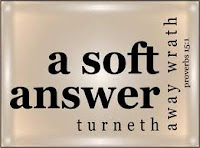 I am too stupid to be a man (Prov. 30:2-4). {"The words of Agur" (Prov. 30:1) are perhaps addressed to his favorite pupils.} We think that if we give of ourselves to seek wisdom and truth, we'll be quite smart. But Prov. 30:2,3 says, "Surely I am too stupid to be a man. I have not the understanding of a man. I have not learned wisdom, nor have I knowledge of the Holy One." Surely, he is not "stupid," but one who humbly knows of and realizes his own severe limitations, ignorance and experience as a mere human before the infinite God (Prov. 30:4; Job 38:4-39:30). Man, in his ignorance, thinks of God as an object of his investigation or speculation, not realizing his utmost overweening pride in doing so. But man who sees himself before God recognizes the sheer immensity of the mystery and majesty of God, and is humbled and awed.
I am too stupid to be a man (Prov. 30:2-4). {"The words of Agur" (Prov. 30:1) are perhaps addressed to his favorite pupils.} We think that if we give of ourselves to seek wisdom and truth, we'll be quite smart. But Prov. 30:2,3 says, "Surely I am too stupid to be a man. I have not the understanding of a man. I have not learned wisdom, nor have I knowledge of the Holy One." Surely, he is not "stupid," but one who humbly knows of and realizes his own severe limitations, ignorance and experience as a mere human before the infinite God (Prov. 30:4; Job 38:4-39:30). Man, in his ignorance, thinks of God as an object of his investigation or speculation, not realizing his utmost overweening pride in doing so. But man who sees himself before God recognizes the sheer immensity of the mystery and majesty of God, and is humbled and awed. God's flawless revelation (Prov. 30:5,6). Prov. 30:5 says, "Every word of God proves true; he is a shield of those who take refuge in him." These verses move from the uncertainty of human speculation to the certainty of divine revelation -- the trustworthiness and reliability of the Bible. This verse supports the doctrine of the “plenary” (full, complete) inspiration of Scripture, extending even to “every word” (2 Sam. 22:31; Ps. 18:30). Yet, the aim of revelation is to promote a living loving trust, not bare knowledge, toward the One God behind "every word of God."
God's flawless revelation (Prov. 30:5,6). Prov. 30:5 says, "Every word of God proves true; he is a shield of those who take refuge in him." These verses move from the uncertainty of human speculation to the certainty of divine revelation -- the trustworthiness and reliability of the Bible. This verse supports the doctrine of the “plenary” (full, complete) inspiration of Scripture, extending even to “every word” (2 Sam. 22:31; Ps. 18:30). Yet, the aim of revelation is to promote a living loving trust, not bare knowledge, toward the One God behind "every word of God."





